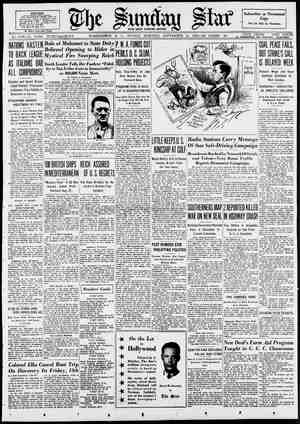Evening Star Newspaper, September 15, 1935, Page 95
You have reached the hourly page view limit. Unlock higher limit to our entire archive!
Subscribers enjoy higher page view limit, downloads, and exclusive features.
Magazine Section T WAS, in 1ts frightening climax, just as Mary Raeburn had pictured it. Here on the wide boulevard she had seen herself in her dreams; behind her, rising tier on tier, the white houses of the City of the Beys. Beneath her the broad ramp leading to the harbor; and beyond the breakwater the big steamer trumpeting a hurry-up call to the last of the shore boats racing to her side. Trumpeting also to Mary Raeburn, the de- serter. To Mary Raeburn of New York, stateroom 57, deck “‘A,” who had “‘jumped’’ the ship. Touching her cheeks was the hot wind rom the desert far to the southward, a nervous, irregular wind, afraid of the city and the sea, ready at any moment to turn and scurry back to the great breasts of sand from which it had thieved its curious warmth. The wind brought disturbing odors. Perfumed rib- bons of air that were drawn slowly before the quivering nostrils of the girl. Now orange blossoms, now saffron, musk, smoke of burning olive roots, cinnamon, and mould. Massed, they became the odor of a mighty continent dead on its feet, yet pos- sessing some fierce unclean power that fought death. The odors brought to Mary Raeburn a tingling fear that was not disagreeable. A fear that had, curiously, the quality of a forced embrace. A sudden, unforeseen embrace. She recalled for an instant a happening at the first masguerade party she had ever at- tended. On a dark stairway, a man had taken her in his arms, kissed her passionately, and THIS WEEK The old woman dragged the fainting girl to her feet and beat her with her bare hands. The crowd cheered in Algiers What would you have done if you had missed the boat on purpose —and come up against this stark rea/i{y.? by JaMEs Francis Dwygr fled before she recognized him. This dark mysterious Africa reached out for her in the same manner. Reached out with great sinewy arms. . .. Her breathing was fast. The trum- peting of the S. S. Jugurtha was like the buzzing of a giant fly caught in a monstrous web. The voice floated to her on the warm air. The speaker was fully eight feet away, but she heard distinctly: ‘“‘Of course mademoiselle knows that the last boat for the steamer has left the landing stage?" “T know,” murmured Mary Raeburn. Was she responding to some fearful question that might entrap her? Was this Africa speaking to her? She wouldn’t look at the stranger who had put the query. A sweet fear pricked her deliciously. The perfumes of the oncoming night were strangely disquieting. They stirred depths within her. The S. S. Jugurtha wheeled and bored boldly into the sea-gloom. Again came the voice: ‘But mademoiselle was on the steamer! Now it has gone without her!" “The latter part of your remark is evi- dent,” said Mary Raeburn. “The first asser- tion shows an annoying watchfulness.” “I saw you with the other tourists as you came up the ramp this moming,” came the quiet answer. This catechistical stuff was troublesome, but hadn't she imagined something like this? The black Evangeline who bossed the Rae- burn kitchen had remarked often: “De ole debbil is allus at yo elbow jes like I is when I'm servin’ de dinner. An’ he is allus whis’prin’ 'bout his nice sins, sayin’, ‘Dis one am good. Jes try it. It am sweet as honey an’ it won’t hurt yo a bit.’ "’ Possibly this was an African devil close to her, waiting to offer some wonder plat du pays. Why had he noticed her as she came up the ramp in the morning? Was her hidden resolve to “jump” the ship so evident that he had remarked it? The thought made her smile. Mary pictured the doings on board the Jugurtha. The wild storming of neighboring capins to exhibit purchases. She thought of her own stateroom. Cabin 57 would be wondering why she had not returned. The patient African devil spoke again. “I suppose,” he ventured, ‘that you intend to catch the steamer at the next port? At Tunis?” Mary Raeburn flamed. “Why the ques- tionnaire?'’ she demanded. She saw him then for the first time as the lights flared up in the garden on the town side of the boulevard. And in the quivering lamplight he was handsome — undeniably. “I humbly beg your pardon,” he stam- mered. “I am ashamed. I thought —1I thought that you had done something im- pulsively and that —and that I could be of service.” After a short pause he added: “I am an American. Fredericksburg, Virginia. Name Ellett. Jack Ellett.” In the silence that followed, a gull-liie spirit, unloosed by fear, flew between th Jugurtha and the girl on the boulevard. “Your absence has not been discovered,” said this spirit-reporter. “Not even Mr. Peter Cranley has noticed. . . . Yes, he is about. . , . Sitting in the bar with Miss Bessie Holt. Bought her a cocktail. She says Algiers has tired her, and Mr. Cranley is comforting her.” Mary Raeburn wondered what the captain of the Jugurtha would do when he found that one of his passengers had been left behind. Of course the captain would bully Mr. Peter Cranley, who had escorted her. Poor Peter! He would have to explain how Mary had given him the slip by pretending that she had a headache and making him believethatshe was
